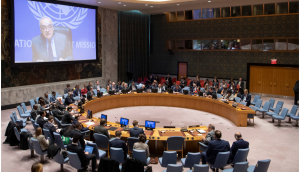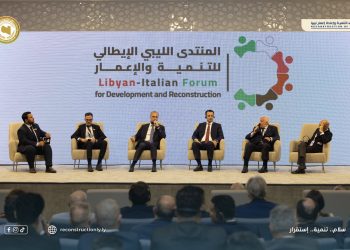By Sami Zaptia.

London, 21 March 2019:
During his latest brief on Libya to the UN Security Council made via a video link from Tripoli yesterday, UNSMIL head Ghassan Salame said Haftar’s Libyan National Army (LNA) forces were generally perceived as a positive and stabilizing development in the south, but asked if the operation was sustainable.
However, he criticised its mobilization further north which he said caused friction and counter-mobilizations which could lead inadvertently to conflict. He expressed concern about human rights violations in Derna.
He confirmed that Hafter and Serraj had ‘‘met’’ in Abu Dhabi and confirmed Serraj’s version of their agreement that Libya will be a democratic state and its army would be under civilian control.
Salame praised the Serraj government economic reforms but stressed that there needs to be more to save the Libyan economy and stressed the need for the forthcoming National Conference (Multaqa) to help Libya exit its transitional state and avoid force becoming the decisive factor in resolving its conflict.
Here is his full brief:
I would have wished to be in New York and have the opportunity to brief you in person. However, it is no exaggeration to say that the situation in Libya has reached a crucial juncture. We are working to prevent recent developments and tensions on the ground from escalating, and instead to pivot to stability and a political compact which will enable an end to the crisis in the country.
On 13 January, the forces of General Haftar peacefully entered Sabha. Whilst there were some minor incidents, the arrival of Haftar’s forces was generally perceived as a positive and stabilizing development.
When these forces moved to take control of Murzuq in the South West, there was active opposition from the Tebu community and affiliated armed groups. In the fighting, and in revenge attacks in the immediate aftermath, at least 18 residents of Murzuq were killed and a further 29 injured. Ninety homes were reported burned in revenge attacks by tribal forces under the LNA command.
Whilst the LNA has brought a large measure of security and stability to the South which enabled the parallel bank in the east to deliver bank notes to Sabha, it is unclear how long the campaign can be sustained given the long resupply lines and the limited financial resources of the parallel government.
There has been some mobilization of LNA forces in Jufra as well as the conducting of patrols towards Sirte. This has led to friction and a rise in tensions with forces from the town of Misrata who remain positioned in Sirte after their anti-ISIS operations there.
In the East, the fighting in Derna came to an end. I am deeply concerned by reports of human rights and humanitarian law violations during the recent military operations in Derna. The fighting reportedly resulted in many civilian casualties.
In the West of the country, local forces have mobilized in response to the current tensions. So far, such local mobilizations appear to be shows of force and no party appears imminently ready to launch an attack against any other. But there is a real risk of miscalculation or of extremist forces starting skirmishes in the hope of drawing others into a larger confrontation.
The Tripoli ceasefire continues to hold, but the Greater Tripoli Security Arrangements Plan remains only partially implemented.
UNSMIL has supported two rounds of preparatory talks between the advisors of Prime Minister Serraj and General Haftar which took place in our Tunis offices. As a result of those talks, the two leaders met in Abu Dhabi and agreed to a number of important principles: Libya shall be a civilian and democratically governed state that enjoys full civilian control of the military, and a peaceful transition of power. The parties also agreed on the need to unify Libya’s long-divided institutions and for the scheduling of national elections before the end of the year.
Many of these principles are not new. Indeed, these talks are the continuation of the process which started in September 2017. What is new is the sincerity to turn these words into the end of the transitional period through elections.
Let me now brief you on other developments and activities on the ground. I am pleased to announce that the UN Hub in Benghazi is open. After many months of being almost open, UN staff are being deployed to Benghazi to better deliver across the East of the country.
Discussion is now underway concerning a further hub in Sabha to support operations in the South of the country and UN programs have also now visited Sabha for the first time since operations were halted there in 2013.
In my previous briefings I warned against the consequences of the economy of predation. I am encouraged by action taken to combat illegal smuggling. On 7 February the public prosecution issued over 100 arrest warrants against individuals, accused of involvement in smuggling and illegal disposal of fuel and ordered the confiscation of 115 fuel stations. This organized fuel smuggling amounts to more than USD 750 million annually.
Overall, Libya’s infrastructure continues to deteriorate at an alarming rate. Basic services, including in health, water and electricity, are eroding. The situation of water production is particularly fragile. With nearly four wells being disabled every month, the western branch of the Man-Made River, which is the primary supplier of water to the north-west, is in imminent danger of collapse.
The 2019 Humanitarian Response Plan for Libya has been launched on 5 February, seeking USD 200 million to continue providing health, protection, water, and shelter to more than half a million of the most vulnerable people in Libya. An estimated 823,000 people, including migrants and 248,000 children, need humanitarian assistance in Libya.
The situation of the economy is mixed. The re-opening of the Sharara oil field, for which the UN played a crucial role, resulted in increased oil production that is returning to 1.2 million barrels per day. The foreign currency exchange fee, in combination with the liberalization of the opportunity to purchase foreign currency, continues to generate revenue, and strengthen the Dinar. This has increased purchasing power and reduced inflation and the profitability of the black market for currency.
While important, these benefits may be short-lived without genuine economic reforms. Such reforms require a direct devaluation of the currency and the lifting of subsidies which consume nearly 10% of the national budget. Working with the two branches of the Central Bank of Libya, the national audit review process will soon begin.
It is extremely positive that the Central Committee responsible for municipal council elections is starting with a new round of nine elections in the Southern and Western parts of Libya on 30 March. In this context, it is essential that there is only one body managing municipal elections.
The High National Electoral Commission is preparing for national elections. We are pleased to see that the HNEC, with the help of the UN and international partners, has finally now moved into its secure new headquarters.
It is now necessary for the government to provide the necessary operational funding for HNEC to finalise preparations for elections.
The Mission has been in steady contact with a number of countries and regional organisations, including the League of Arab States, the African Union, and the European Union. I joined the Secretary General at the African Union Summit and welcome the AU’s interest in supporting the UN Action Plan. I am grateful for the support expressed for our efforts during the visit of Commissioner Chergui and USG DiCarlo on 12-13 March.
The National Conference will be held from 14 to 16 April inside Libya. It represents a critical opportunity to end the transitional period, which began eight years ago.
Ahead of the National Conference, we are working with many parties to ensure as broad a buy-in as possible to the political process. What is clear is that the Libyan people fervently desire that their institutions be united as soon as possible. Unfortunately, they are up against powerful forces, which have materially profited from the country’s chaos and division and are therefore loath to work towards a unification.
There is much at stake. If the opportunity presented by the National Conference is not seized, then we will be faced with only two possible options: prolonged stalemate or conflict. This stalemate may also ultimately lead to conflict.
Or conflict may erupt much sooner. A failure now to advance the political process demonstrates absolutely that the country is totally controlled by force of arms. But today, we have the ability to step back from the edge of this precipice.
The National Conference offers a crucial opportunity for all parties, with no exclusion, to put aside their differences for the good of the country, to unite, to avoid war and to choose a path of peace and prosperity.
The National Conference will choose whether to endorse the National Charter which was the product of the National Conference consultative process.
It will also chart a roadmap to conclude the transitional period: through simultaneous parliamentary and presidential elections, or through phased elections. It will provide recommendations on how to deal with the Draft Constitution produced by the Constitutional Drafting Assembly.
The days ahead will prove foundational to the years ahead for Libyans and the region writ large. I call on Libyans to come together and to avoid acts of obstruction and incitement. There has been a notable uptick in the weaponization of media platforms as tools of incitement. This is tearing at Libya’s fragile but vital social fabric and could well be used to instigate violence. At this sensitive time, I call on all actors to refrain from the use of inflammatory and alienating rhetoric in the public sphere.
I also call on all in the international community to put the interests of the Libyan people first, and to act committedly and sincerely to pressure all parties to avoid conflict and conclude a peaceful formula to end the transitional period in Libya, for the sake of all of the Libyan people.







